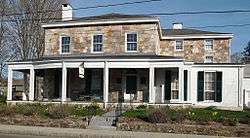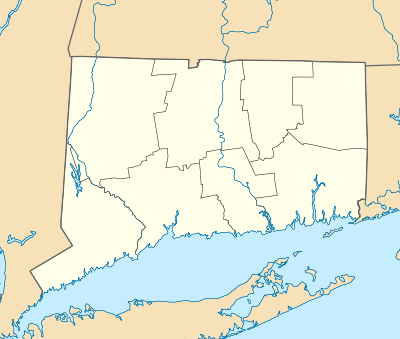Perkins-Rockwell House
The Perkins-Rockwell House is a historic house museum at 42 Rockwell Street in Norwich, Connecticut. Built in 1818, it is locally distinctive as a well-preserved stone house of the Federal period, and for its association with the locally prominent Perkins and Rockwell families; this house was home to John A. Rockwell, a prominent local lawyer who married into the Perkins family, and also served as a member of Congress.[2] The house was listed on the National Register of Historic Places on October 17, 1985.[1] The house is currently owned by the Faith Trumbull Chapter of the Daughters of the American Revolution (DAR), along with the adjacent Nathaniel Backus House.
Perkins-Rockwell House | |
 | |
  | |
| Location | 42 Rockwell Street, Norwich, Connecticut |
|---|---|
| Coordinates | 41°32′5″N 72°4′45″W |
| Area | 1 acre (0.40 ha) |
| Built | 1818 |
| Built by | Perkins, Joseph |
| Architectural style | Federal |
| Part of | Chelsea Parade Historic District (ID88003215) |
| NRHP reference No. | 85003144[1] |
| Significant dates | |
| Added to NRHP | October 17, 1985 |
| Designated CP | May 12, 1989 |
Description and history
The Perkins-Rockwell House is located near Norwich's Chelsea Parade, on the north side of Rockwell Street between Crescent Street and McKinley Avenue. It is a large Federal style house, built of random-cut ashlar granite, with a hip roof. A single-story porch extends across the building's front and wraps around the left side. There is a single-story wood frame addition east of the front facade, set before a recessed original kitchen section. The interior is finished with high quality woodwork, which is mostly Federal in style. Passages between the public rooms downstairs are typically finished as keystoned arches.[2]
The house was built between 1814 and 1818 by Joseph Perkins, a descendant of one of the area's early settlers. His daughter, Mary Perkins Rockwell, and her husband John A. Rockwell inherited the property, making a number of alterations to it. The Rockwell family retained ownership, successive generations occupying it until 1934, when they gave it to the local DAR chapter.[2]
References
- "National Register Information System". National Register of Historic Places. National Park Service. March 13, 2009.
- Jan Cunningham and John Herzan (April 16, 1985). "National Register of Historic Places Registration: Perkins-Rockwell House". National Park Service. and accompanying nine photos from 1985